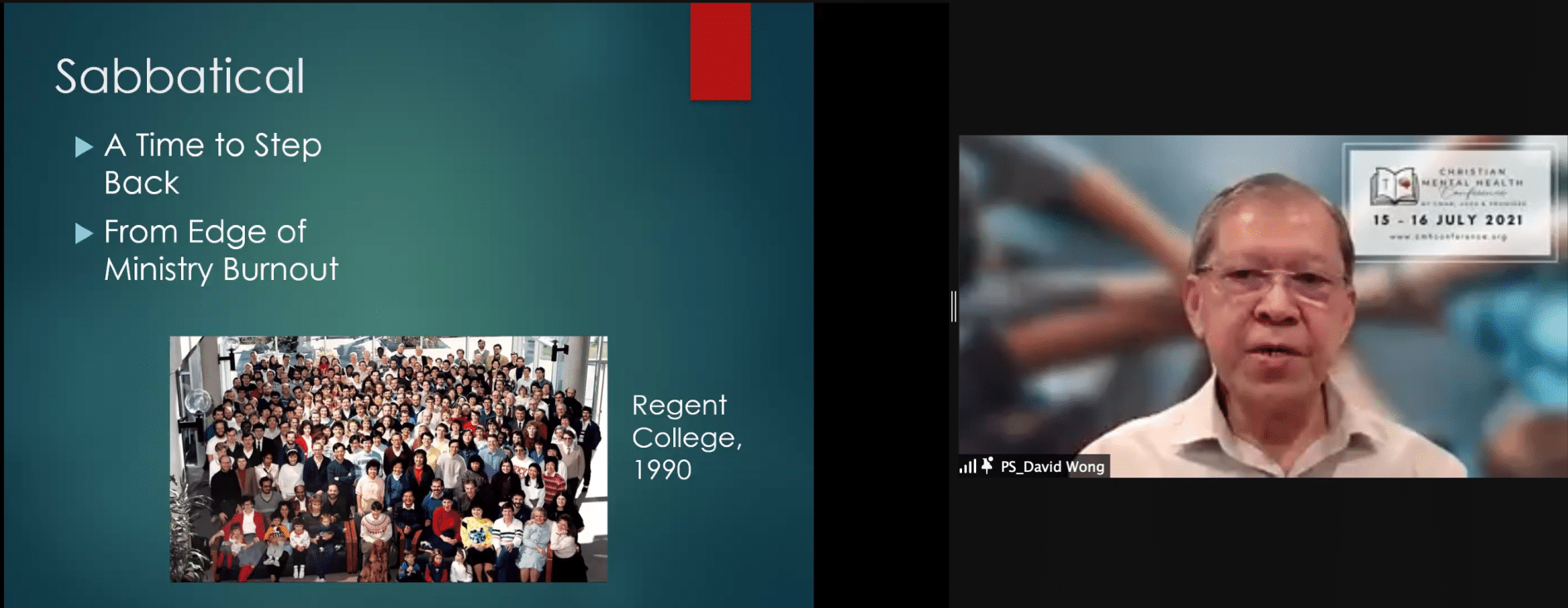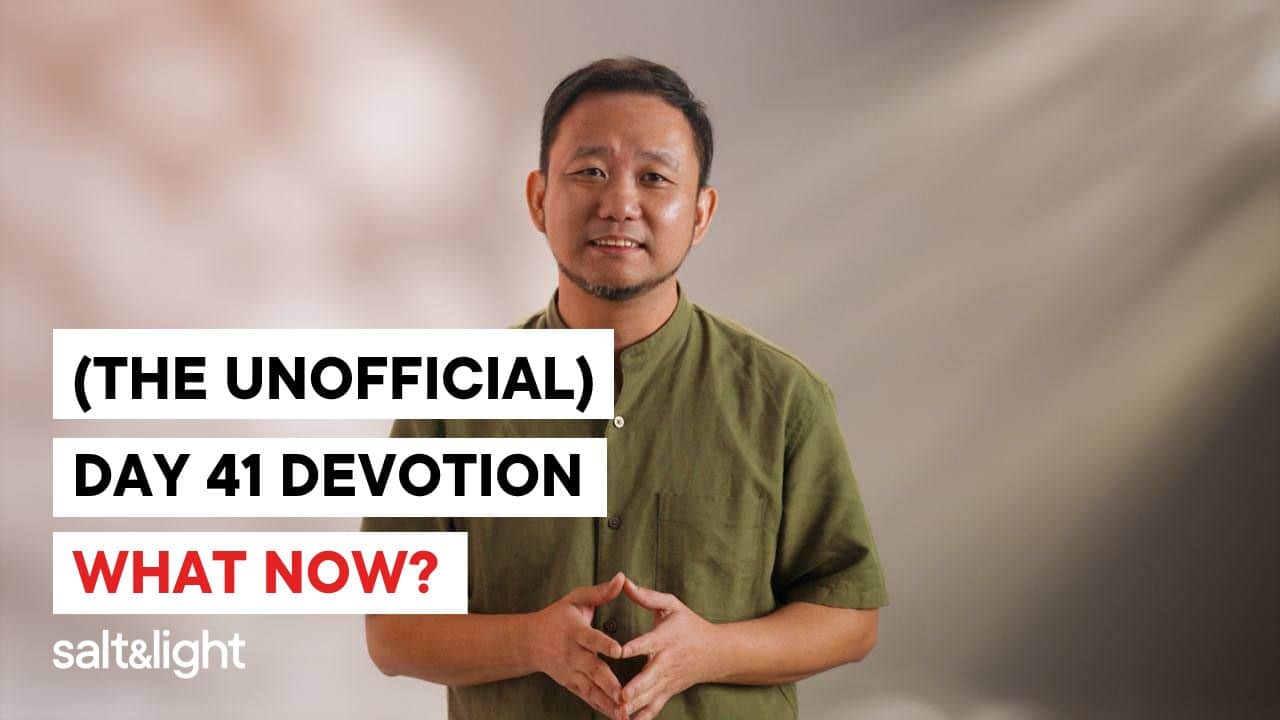“We are a sheep first to our Shepherd, before we are a shepherd of God’s people”: Rev Dr David Wong on care for pastors
Rev Dr David Wong // June 20, 2023, 11:37 am

In the lead-up to the Christian Mental Health Conference 2023 in July, Rev Dr David Wong shares about his recovery from the edge of ministry burnout, and why it is important for pastors to care for themselves before caring for their flock. Photo by Venus Major on Unsplash.
Many people can recite by heart the flight safety instructions before a plane takes off.
“In the event of decompression, an oxygen mask will fall from the ceiling. Pull the mask towards you, place it over your nose and breathe normally.
“If you are travelling with young children, attend to yourself first before attempting to help others.”
Rev Dr David Wong, advisory pastor of Zion Bishan Bible-Presbyterian Church, used this image to illustrate the importance of pastors caring for one’s self before they can look after their flock.
Ps David shared his personal story of recovery from the edge of pastoral burnout in the late 1980s with other pastors and church leaders at the inaugural Christian Mental Health Conference (CMHC). It was held online in July 2021.
(See details at the end of story on how to sign up for this year’s conference held on July 6 and 7.)
“We are a sheep first to the Lord, our Shepherd, before we are a shepherd of God’s people.”
At that time, he felt “a tsunami of emotions: Hurt, disbelief, outrage, distress and grief”.
In his talk on Pastoral Self-Care that he dubbed “taking care of yourself as you take care of others”, Ps David also drew on a second image: How God chose His servant David.
“David was a shepherd of sheep before he became a shepherd of people,” said Ps David.
“In that well-known Psalm 23:2, David said: ‘The Lord is my shepherd. He makes me lie down in green pastures.’
“In terms of self-care, it means that we remember that we are a sheep first to the Lord, our Shepherd, before we are a shepherd of God’s people.”
The following is Ps David’s testimony from the conference, reported with permission:
I was deep in the jungle of Nicaragua on a boat. My wife – who was training teachers – and I were visiting some schools.
If God has chosen us to serve Him, will He also not take care of us?
I was thousands of miles away from Singapore and my mind was preoccupied with what was happening with the church back home. I was struggling with some challenges we were facing.
I thought to myself: “Why am I thinking about all these things now?”
Then this hymn came to me, and I had to sing it to myself over and over again until the words sank in:
“Day by day and with each passing moment,
Strength I find to meet my trials here;
Trusting in my Father’s wise bestowment,
I have no cause for worry or for fear.
He whose heart is kind beyond all measure
Gives unto each day what He deems best
Lovingly it’s part of pain and pleasure,
Mingling toil with peace and rest.”
We need to avail ourselves of the means of grace God has provided.
In other words, if God has chosen us to serve Him, will He also not take care of us?
We may be the shepherd giving care but we are also the sheep needing care.
Remember that Jesus said: “You did not choose Me, but I chose you and appointed you to go and bear fruit.” (John 15:16).
Very often, when I’m stressed or when I reach a point where I cannot take it anymore, I would turn to the Lord and say: “You know, I didn’t choose this. You are the one who chose me.”
I believe our Lord, our God, is responsible and is taking care of us as we take care of His people. We need to avail ourselves of the means of grace He has provided.
Means of grace
At the beginning of the 1990s, I went on a sabbatical to Regent College in Vancouver.
Looking back, if I had not gone on that six-month sabbatical, I would have suffered from terrible ministry burnout.
During that sabbatical, I was able to find rest and recovery as I availed myself of three means of grace from God:
1. God’s Word
I asked myself: Do I read God’s Word to nourish my soul or do I read it to use it for ministry?
Do I read God’s Word to nourish my soul or do I read it to use it for ministry?
When pastors read the Bible, we are often looking for a sermon outline.
We are looking for how we can use something to encourage someone.
To start with, do we have a discipline of reading the Word of God? To practise quiet time – at the beginning or end of the day – just reading the Word of God, to apply it to ourselves?
There’s a tendency for us to go to the Word of God to master it. But the Word of God is meant to master us. In other words, we come under the authority of the Word.
When I was on my sabbatical, I had the advantage of not being on any particular course. I was just sitting in classes, just taking in the Word of God as it was taught.
I didn’t have to learn it to preach it. I basically let the Word of God sink into me to feed me.
2. God’s community
I was in Regent College when I heard the news that the son of my younger brother had passed away. It was such a devastating blow to me.

“I was just one of 300 students in the community at Regent College. I felt safe with them,” said Ps David. Screenshot from video of his talk at the Christian Mental Health Conference 2021.
I remember that very cold spring morning when I reached the college.
I was there not as a pastor. I was there as one of the people in the community.
A big, burly New Testament professor opened the door. He greeted me and asked me: “How are you?”
I blurted out: “My brother’s son just passed away.”
Well, he put his big arms around me and pulled me inside from the cold. And then he called to a number of students standing nearby: “Come, let us pray for our brother. He just lost his nephew.”
They came around me and they put their hands on my shoulder and prayed. I was there not as a pastor. I was there as one of the people in the community. I felt safe with them.
So as pastors, we need to ask ourselves: “Do I belong to such a community – whether it’s large or small? Do I belong to a community where I feel safe to be my real and true self?”
3. God’s world
The other thing that helped me was the beauty of Vancouver, with its mountains and beaches. It has more of what is God-made than what is man-made. Being in a place where we could see nature around was a great help to me.
Being in a place where we could see nature around was a great help to me.
So we need to ask ourselves: Do I enjoy the beauty that’s found in nature, in music, in movies, in stories, in craft, in the ordinary things of life?
One of the things that really helped me is finding something to do that runs parallel with the ministry – not something that is directly involved in the ministry.
Something that you can be engaged in, that you can be passionate about.
I think of people like John Stott who had a passion for bird watching – or someone closer to home like Bobby Sng who was an avid stamp collector.
When I was under a lot of stress, I found doing jigsaw puzzles very relaxing. It took my mind off problems.
Questions to ask ourselves as church leaders
There are more questions that we may want to ask ourselves as we think about how to take care of ourselves as we take care of others.
1. How well do I take care of my body?
Many years ago, I met with a group of people in ministry. We heard that a pastor, in his early 40s, had just died from colorectal cancer, leaving behind a young family.
I was told that colorectal cancer is very common among men. It is the easiest of cancers to cure when detected early (through a colonoscopy), and the most difficult to cure when detected late.
So among ourselves, we made a pledge for the sake of our families, our church, to go for colonoscopies regularly.
So there are things we can do to take care of our bodies.
2. Do I have someone to help me clear my mind?
Those of us in ministry usually find that, when we talk to people, we are ministering to them.
But we need people whom we can talk to who will minister to us to help us clear our minds – people we can share our deepest innermost thoughts with so that they can help us get things off our chest.
3. Am I trying to do everything on my own?
When I was on sabbatical, I read the book, The Contemplative Pastor, by American Presbyterian minister, Eugene Peterson.
There’s a chapter called “The Unbusy Pastor”.
Some of us pastors make people so dependent on us. And not only do we spoil them, we hurt ourselves.
Peterson says that the term “busy” should never be used of a pastor. What he means is: Don’t feel that you are indispensable. If you are busy, it means you don’t have the patience to train someone to share your work with you.
Eugene Peterson was writing from experience. Before he went on sabbatical – after some 20 years pastoring the same church – the church wondered how they were going to manage without him.
In fact, he wondered how the church would manage without him. But when he was on sabbatical, the church did very well without him.
When he was back, he was going to go on a retreat with some of his church people. That day, he was delayed by a hospital visit. When he went to church, he found everybody had left. He was upset because they had always waited for him. After his sabbatical, the church had learned to live without him. Anyway, they thought he knew where they were meeting, so they didn’t wait for him.
As he thought about it, he realised that this is how it should be.
Some of us pastors make people so dependent on us. And not only do we spoil them, we hurt ourselves.
We don’t teach our members to take ownership of their own growth; we feel so responsible for them that we want to do everything for them. So that’s something which we need to think about.
Sabbaticals and sacrifice
Ps David also answered questions from attendees at the conference.
How many years must a pastor work before he goes on a sabbatical?
When we talk about sabbaticals, we also need to talk about Sabbath.
I would ask those who are lay leaders to say: “Let’s take care of our pastor. After so many years of service, let’s give him a break.”
I’m really blessed because the two churches I pastored (Mount Carmel Bible-Presbyterian Church for some 20 years and Zion Bishan for 12 years) have provisions for sabbaticals after six years.
But, even if we do not have the privilege of a sabbatical, we have a sabbath every week.
I learned from a very seasoned pastor that you need to have a finishing line in your ministry each week, a point where you say: “That’s the end of the week.”
When I was a pastor, my finish line was the end of the evening service. I would meet my granddaughter and the family for dinner. That was the beginning of my Sabbath, and I had something to look forward to.
When we talk about sabbaticals and self-care, it’s not just a pastor taking care of himself, it’s not just God taking care of him – it’s also the church taking care of the pastor.

Ps David (left) with Ps Chua Seng Lee, a co-chair of the Christian Mental Health Conference 2021. Screenshot from a video of Ps David’s talk.
It’s very difficult for the pastor to ask for a policy on sabbaticals because he is asking something for himself.
So I would ask those of you who are elders, deacons or lay leaders to say: “Let’s take care of our pastor. After so many years of service, let’s give him a break.”
On the part of pastors, I would say that a sabbatical is not an entitlement. It is a privilege. In other words, you must satisfy yourself that you have worked hard during those six years or so, that you need a break.
You need to convince your leaders that your going on a sabbatical will help you – and in the end, help you help the church. It is not something you go on to just have a wonderful holiday with your family.
How do you draw the line between self-care and sacrifice? After all, ministry involves sacrifice.
There are two words that sound similar but they’re different: One is self-interest and the other is selfish interest.
So for example, if a person who has a problem with drinking says: “I’m going to stop drinking so that I can help my family, and that will also help my health”, that’s self-interest. You’re doing something to help yourself so that you can help others.
Selfish interest is if he says: “I don’t care. I’ll keep drinking because I just want to enjoy the pleasure of drinking.”
I think sacrifice is self-interest, not selfish interest.
You want to take care of yourself so that you can take care of others. You don’t sacrifice your health in the short term and then end up becoming a big problem for people in the long term.
So I think there is a line to be drawn when sacrifice becomes damaging to you and in turn becomes damaging to your flock.
The Christian Mental Health Conference supports – as well as equips – church leaders by connecting them with mental health professionals and resources. This year’s conference is on July 6 and 7.
Sign up here by June 26. The conference is not open to the public.
RELATED STORIES:
Pastors are human too: The mental health struggles some church leaders face
We are an independent, non-profit organisation that relies on the generosity of our readers, such as yourself, to continue serving the kingdom. Every dollar donated goes directly back into our editorial coverage.
Would you consider partnering with us in our kingdom work by supporting us financially, either as a one-off donation, or a recurring pledge?
Support Salt&Light




